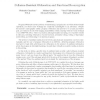Free Online Productivity Tools
i2Speak
i2Symbol
i2OCR
iTex2Img
iWeb2Print
iWeb2Shot
i2Type
iPdf2Split
iPdf2Merge
i2Bopomofo
i2Arabic
i2Style
i2Image
i2PDF
iLatex2Rtf
Sci2ools
126
Voted
IACR
2011
2011
Collusion Resistant Obfuscation and Functional Re-encryption
Program Obfuscation is the problem of transforming a program into one which is functionally equivalent, yet whose inner workings are completely unintelligible to an adversary. Despite its immense cryptographic utility, program obfuscation has proved to be a hard and elusive goal, as evidenced by the wide-ranging impossibility results, starting with the work of Barak et al. (CRYPTO 2001). There is a limited, although steadily increasing, set of positive results in this area, including obfuscation of point functions, proximity testing, testing of hyperplane membership, and obfuscating re-encryption programs. The presence of auxiliary inputs about secrets is a practical and omnipresent concern in cryptography, and the case of program obfuscation is no different. Achieving program obfuscation was hard to begin with; achieving secure obfuscation in the presence of auxiliary information about the program is downright daunting. In particular, virtually no positive results are known in this ...
| Added | 23 Dec 2011 |
| Updated | 23 Dec 2011 |
| Type | Journal |
| Year | 2011 |
| Where | IACR |
| Authors | Nishanth Chandran, Melissa Chase, Vinod Vaikuntanathan |
Comments (0)

